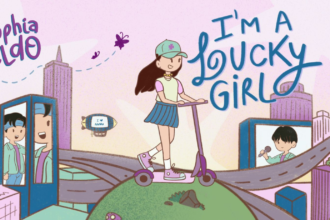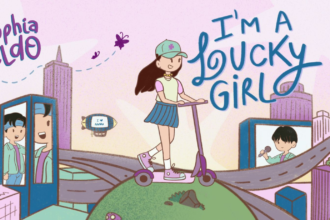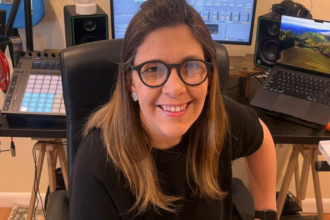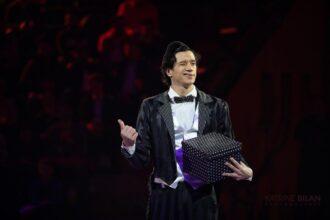Rodrigo Lopes, better known as Caramico, is a true multifaceted artist. With his musical streak, he has been winning hearts since 2020, but his artistic journey started way before that. At the age of 29, Caramico has already made incursions into television, theater, dubbing and even film directing.
With a degree in Radio and TV, he worked for TV Fama, on RedeTV!, where he did memorable interviews, such as the one with singer Demi Lovato. In theatre, he acted in several plays, including “Othello, the Moor of Venice” and “Peter Pan”.
However, it was during the isolation imposed by the pandemic that Caramico rediscovered his passion for music and started composing. With the help of his childhood friend, Vicente, and producer Carlos Bechet, he is now working on his first authorial album, which promises to be an emotional work of nine tracks, each one telling a chapter of Caramico’s story during the pandemic.
His songs, such as “Viver é Meu Presente,” “Fique Zen” and “Não Importa o Lugar,” released on streaming platforms and on his official YouTube channel, address contemporary themes, including loneliness and mismatches, with multiple interpretations. of love.
In addition, Caramico released his first EP of new material, “Só Lidando,” in September 2022, with three original tracks that explore his experiences during the endless days of the pandemic.
In 2023, in the first year of his musical journey, he expanded his presence even further with the “Sessions” project on his YouTube channel, where he performs acoustic and live reinterpretations of his songs and MPB classics. And he didn’t stop there, releasing his second EP, “Diz Em Canto,” with three original tracks.
Currently, Caramico also shares his knowledge as a theater teacher in São Paulo, demonstrating that his passion for the arts is truly multifaceted and complete. This is just the beginning of a journey that promises even more successes and exciting news.
Rodrigo, you have a multifaceted career, going through radio, acting, dubbing and now music. How do you balance all these artistic passions?
I balance all these passions because they complement each other… one inspires the other, ends up contemplating the other. When I express myself, I end up giving vent to different parts of myself and that, at the same time, ends up complementing my work. As an actor, I have the feeling that I can make my work as a singer grow and vice versa. All my aspects make me grow as an artist. I have this need to express myself in all these places, as well as other multi-artists who inspire me too. I believe that when it makes sense, that it’s not something you’re doing for the sake of doing it, we can handle it, it makes this expressiveness happen. She is part of who we are.
His journey in music began during the isolation imposed by the pandemic. What inspired you to start composing and exploring this area?
What inspired me was social isolation due to the pandemic. A very difficult time for me and for many people. A phase of anguish, doubts, many fears and also, in addition to the need to express my feelings, there was the context that my jobs as a professional were all stopped, entertainment stopped. It was a moment to understand the artistic movement and what I could do at that moment because of an expressive need. The guitar was my partner, music and composition worked almost like a therapeutic process. I found the answer to what I could do at that moment through composition.
The stage name “Caramico” is quite unique and has a special meaning for you. Could you share a little more about how that name came about and what it represents for your career?
Caramico, without a doubt, is a very special name. It arises from a need to understand myself as a new artist. I always used Rodrigo Lopes in my work as an actor and dubbing artist, but in this new moment when I was composing new songs and seeing myself as a singer again, I needed a drastic change, which represented this transformation. I’ve always been enchanted by unique names like Djavan, Emicida, Jão… I’ve always liked unique names. Caramico has always been there, it’s one of my last names. I didn’t look at him much because in childhood I suffered a certain amount of bullying, but I understood that that was exactly what I needed, to bring that as an identity. I am this hybrid person, which at first may be difficult to understand, even like the name itself, sometimes misspelled, but which later makes me who I am, makes me unique, different. It’s a name that wherever I go and say it, I end up tagging people. I’m very proud of that, because he’s from my family, he’s from my mother, who always encouraged my work, inspired me. So it’s special for all that. For representing who I am and for, in fact, strengthening that image so that I have no doubts or fears about that name.
You are releasing your first authoral album, which addresses your experience during the pandemic. Could you give us a glimpse of what listeners can expect from this album and the messages it brings?
This last release, which is the EP Diz Em Canto, talks a lot with my other EP, Só Lidando, which brings this whole vibe of being in solitude but, at the same time, disenchanting. The title is a joke, in the sense of inducing people to become disenchanted with singing. I think that says a lot about what this work is about and what people can expect from it. It says a lot about this place that we were during the pandemic, but not only, places that we find ourselves during life, where we have doubts, where we get frustrated, but where we see these frustrations become inspirations. On several occasions our expectations are not fulfilled, but it is through this closed door that others open and that’s exactly what happened to me. It was from my frustrations that I began to see myself as a composer, I made my songs and thanks to that I’m here giving this interview. I think the album talks a lot about that… about dealing with loneliness and frustrations and how to deal with that.
At the beginning of your musical career, you released several tracks, including “Viver é Meu Presente”, “Stay Zen” and “Não Importa o Lugar”. Each of them addresses different aspects of life. Can you tell us more about the creative process behind these songs?
The creative process is very varied. Each song has its story and its process. I don’t have a method that I use for everything. I feel that I discover the music, open myself to the possibilities and let myself be carried away by what the music means, as if I were polishing it and finding it somewhere. Of course, this moment is always connected to some inspiration, whether it’s everyday life, or some fact that happened to me, and the vibe I’m in.

The EP “Só Lidando” was also an important milestone in his musical journey. How does this project represent your artistic and emotional evolution throughout the pandemic?
It represents a lot of my artistic and emotional evolution. The two things go together. I put a lot of my emotional process and the maturation process of some ideas I had during the pandemic into the songs on Só Lidando. Dealing with loneliness is very difficult, it’s something I rarely did in my life and I was forced to do it during the pandemic and it brought me emotional consequences that I deal with to this day. I think I brought some of that into my songs on this EP. I think it speaks a lot about my emotional evolution and, consequently, my evolution as an artist because the first songs I released talk about another place, about desires and desires, about recognizing some things…, but Só Lidando was when I set out to dive into the heart of what I was feeling.
You also started the “Sessions” project, in which you share acoustic and live versions of your songs, as well as MPB classics. How did the idea for this project come about and what does it mean to you as an artist?
The idea comes from my connection with artists who started to do more minimalist and intimate things. It brought me something very charming. It was wonderful to see artists that I admired bringing this aspect to their sound, and to themselves, from a more intimate point of view, playing in the living room at home, in places that we weren’t used to seeing. I was really enchanted by the time desk too, which is already an older idea, but I started to hear a lot of it during the pandemic, and then I had the idea of doing something similar, looking deeper into myself and my launch, which was, until then, Só Lidando. I wanted to bring this idea that those watching would feel there, with me, inside my mind, making a metaphor… this has a lot to do with the Só Lidando project. And bringing some reinterpretations of MPB is a way of showing my audience the artists I admire, who are inspiration for my sound. I invited wonderful artists to play with me and it was incredible. The first time I brought some versions of my songs live, where the audience can see everything intimately, as if we were very close.
On the EP “Diz Em Canto”, you released songs like “A Inspiração”, “Dia Adia” and “Uma Trégua”. Each title seems to convey a profound message. Can you tell us about the meaning behind these tracks?
The idea of these names and even the order of the songs is the idea of a lyrical self, a character, living through trials, the hero’s journey itself, with a beginning, middle and end. In the beginning, we have A Inspiração, then Dia Adia, which deals with conflicts, where he perceives this conflict, and then A Trégua. And he realizes he doesn’t have a resolution. There’s only one truce. So basically, he gets tired and asks for that time, allowing him to still see his journey. This journey, by the way, will be an eternal process. This search for something that we, every hour, understand each other within an individual process. The songs talk a lot about all of this.
In addition to music, you also act as a theater teacher. How does this teaching experience influence your own art and creative journey?
This experience is fundamental to my artistic process. In addition, of course, to learning a lot there, with this exchange with the students, it is a way of connecting with what is most precious in the educational process. This makes me very happy, inspires me, lights me up, awakens my desire for composition, for projects… it is very inspiring to follow the trajectory of a student who arrives not feeling capable and leaves knowing that he has succeeded. This is extremely inspiring because we, artists, sabotage ourselves a lot. So to see this motivation coming from a child is very special. In addition to everything I learn from them, a very powerful, engaged youth. Everything I learn is very valuable and is certainly fundamental to my entire creative process.
Looking to the future, what are your plans and aspirations as an artist? What new challenges or projects do you hope to explore?
I’m at a time when I want to add people to my work, other artists, partnerships with male and female singers. I also intend to release more songs this year, I already have some that are in the oven, they are already composed and I’m going to enter the studio. But right now my focus is connecting with other artists. I recently participated in a festival, Hacktown, in Minas Gerais, and it was wonderful. This intensified this need for me to be with other artists. Whether playing together, releasing music together or even being together at a show. So, I can say that I am in this desire for more exchanges, yes. And, of course, I really want to do more shows. I’m from São Paulo, I played my first show abroad recently and it’s really nice to see that many other people in this country already know me.
Follow Caramico on Instagram





